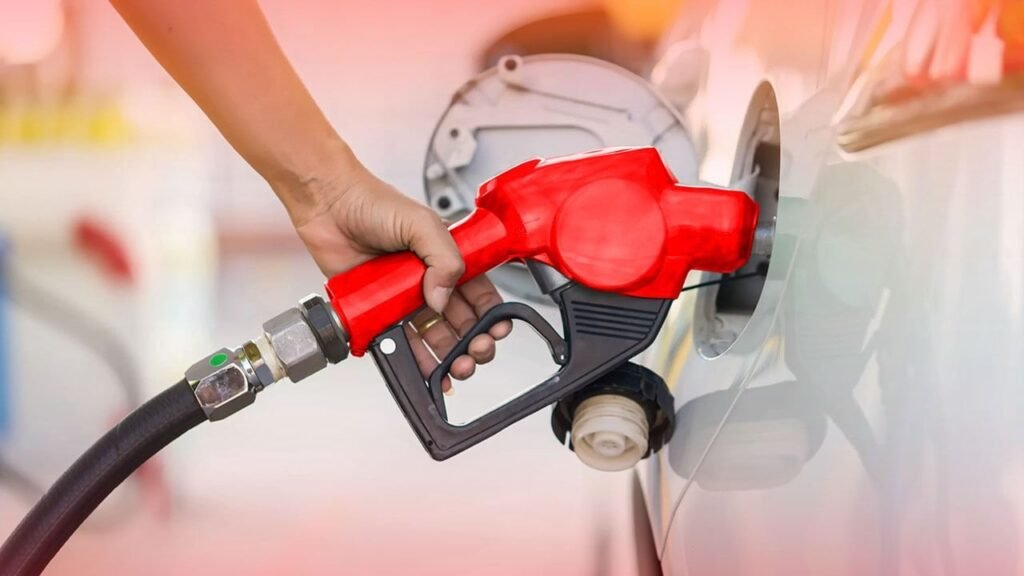The petrol, diesel prices hiked again in Pakistan, marking the third hike in a month and intensifying the financial burden on households already struggling with inflation. The Finance Ministry stated that the new retail fuel rates were set after assessing the international oil market and the impact of the weakening rupee. According to the official notification, the super petrol price now stands at Rs 264.61 per litre, while High Speed Diesel (HSD) has reached Rs 269.99 per litre. The updated kerosene price is Rs 176.81 per litre, and Light Diesel Oil (LDO) costs Rs 159.76 per litre. Officials explained that exchange rate losses, rising import bills, and government taxes fueled the latest adjustment.
Current Petrol and Diesel Prices
The current petrol and diesel rates in Pakistan now show another sharp adjustment compared to early September. The petrol price increased by Rs 8.44 per litre, while the diesel price surged by Rs 5.48 per litre, leaving many citizens frustrated with the frequent hikes. According to officials, these revisions are made under the temporary 15-day price window used for price determination by the Oil & Gas Regulatory Authority (OGRA).
Here is the updated comparison of super petrol price, High Speed Diesel (HSD), kerosene price, and Light Diesel Oil (LDO) after the latest change:
| Fuel Type | Old Price (PKR/litre) | New Price (PKR/litre) | Change |
| Petrol | 256.17 | 264.61 | +8.44 |
| HSD | 264.51 | 269.99 | +5.48 |
| Kerosene | 171.61 | 176.81 | +5.20 |
| LDO | 155.87 | 159.76 | +3.89 |
These fuel stations notification updates apply nationwide, and drivers can also verify details using tools such as the Shell station locator or directly at local pumps.
Latest Petrol Price Updates
The government kept petrol prices stable in early September, with super petrol at Rs264.61 per litre. However, according to media reports, OGRA has prepared a working paper that suggests a possible petrol increase Rs 1.54 per litre from September 16. Officials argue that this adjustment is linked to the foreign exchange impact and international supply constraints. Citizens remain worried since any rise directly affects household budgets and planning.
Key highlights from the update:
- Current super petrol price: Rs264.61 per litre.
- A proposed hike of Rs1.54 per litre is under review.
- OGRA summary submission cites pressure from the dollar rate and global markets.
Diesel Price Changes
At present, High Speed Diesel (HSD) costs Rs269.99 per litre, unchanged from the last revision. Still, OGRA’s proposal suggests a possible diesel increase Rs 4.79 per litre in the next 15-day review. This is critical because diesel powers trucks, buses, and farm machinery. Any confirmed hike would raise transportation cost, push up food prices, and hurt the agriculture sector.
Effects of a potential diesel hike:
- Truck operators may increase freight charges.
- Passenger bus fares could rise nationwide.
- Farmers would face higher expenses for tractors and pumps.
- Kerosene and light diesel adjustments may add pressure on rural households.
Price Increase Details
The proposed hike stems from three main factors: volatility in the international oil market, a weaker rupee causing exchange rate losses, and higher government taxes like the fuel levy. Pakistan imports most of its fuel in US dollars, so every currency dip adds cost. Officials confirmed that the approval process follows OGRA’s working paper and is finalized by the Finance Ministry after the Prime Minister approval.
Main drivers behind the proposed hike:
- Rising global crude oil prices.
- Dollar strength and foreign exchange impact.
- Levy and tax adjustments by the government.
- Recommendations from OGRA’s price determination mechanism.
Impact on Public
The consumer impact of repeated fuel hikes is already visible. Auto-rickshaw drivers have raised fares, while ride-hailing services now charge extra. Daily wage earners who depend on travel for work are hit the hardest. The rising super petrol price leaves many households cutting down on non-essential travel.
Impact on daily life:
- Higher transportation cost raises grocery prices.
- Increased school van charges burden parents.
- Fuel-based electricity generation becomes expensive.
- Rural families face tough times due to kerosene price hike.
Moreover, higher transportation cost translates into expensive groceries, school van charges, and even electricity tariffs, as fuel is used in power generation. A Karachi resident told Geo News, “When petrol, diesel prices hiked again in Pakistan, the struggle doubled for us. Every item in the market costs more now.”
Government Announcements
The government explained that the approval process for the increase followed usual rules. The Prime Minister approval came after careful review of the OGRA summary submission. Officials claim that while the hike hurts the public, it was unavoidable because of the international supply constraints.
Main points from government:
- Decision based on temporary 15-day price window.
- Relief only possible if rupee strengthens.
- Dependence on international oil market continues.
- Fuel levy and IMF conditions restrict subsidies.
The Finance Ministry also announced that any relief will depend on stability in the international oil market and a stronger rupee. Until then, the temporary 15-day price window will continue to decide future rates. This means more revisions could arrive by the end of the month if conditions remain unstable.
Read more latest blogs here:
iOS 26 Launch Date Confirmed: Global Release September 15
Points Table Asia Cup 2025 Today: Latest Standings Update
Charlie Kirk Suspect Tyler Robinson Arrested After Confession
Conclusion
The fact that petrol, diesel prices hiked again in Pakistan for the third time in a single month highlights the fragile state of the economy. Rising retail fuel rates have intensified the financial stress on citizens and businesses alike. Without a strategy to reduce dependence on imports, such shocks will continue.
Pakistan needs long-term reforms, including investment in local refining and alternative energy sources, to protect itself from global oil shocks. Until then, every fuel stations notification will remind the public of how vulnerable they are to changes in the international oil market.
Zainab Farooq is a dedicated reporter and celebrity wealth analyst with Pakistan Coverage, committed to bringing readers timely and accurate information across diverse topics. With a passion for storytelling and fact-based reporting, she covers everything from celebrity net worth insights and entertainment industry analysis to local Pakistani developments and global trends, ensuring readers stay informed about the stories that shape our world.




